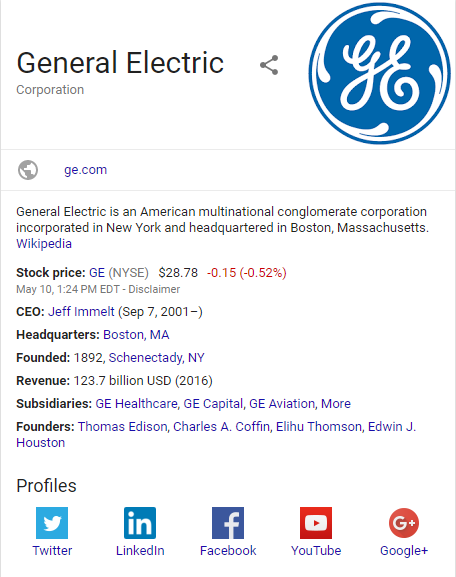 Most business owners have three main challenges when it comes to using social media marketing:
Most business owners have three main challenges when it comes to using social media marketing:
- How best to use and optimize the platforms.
- How to get traffic to the website and platforms.
- How to turn followers into customers.
If you don’t have a high-level understanding of the goals behind using social media and the best practices to reach those goals, it can be tough to see any social ROI or value that might come from investing in it.
While social shares may or may not affect a webpage’s position in search listings, your company page influences your search results. In fact, social media profiles are often amongst the top results in listings for brand name searches.
For example, if you search “General Electric” in Google, the company’s Twitter profile appears as the second result, after the brand website.

Moreover, Google also displays the company’s various social profiles in the right-hand sidebar at the very top of the search results page.

Having company social accounts certainly doesn’t hurt your SEO, but it’s important to remember the purpose of investing in social. Making an investment in social media marketing is just one of the many ways your business can convert website visitors into happy customers.
Ultimately, the answer to “Does social media have an impact on my bottom line?” comes with your ability to prove the results of your social efforts. However, to determine results, you (or your social marketing manager) must understand the best practices to reach your goals.
At a very basic level, social media is a great and powerful tool that can help companies achieve two primary goals: attracting new visitors and engaging current customers.
1,000 visitors to your website from various social channels do nothing for your business unless you convert them into customers. You still need those 1,000 visitors to have a chance at converting anything. As you plot out your social media strategy, you’ll also want to research and set conversion goals – such as 10% of visitors converted into clients.
Typically, business owners who try to do their own social media struggle with the day-to-day activity that goes into maintaining a professional company page that represents their brand well.
When publishing original and third-party content to your social channels, you need to be:
- Consistent with multiple posts (varies for each channel) throughout the day.
- Relevant to your buyer personas with content they find valuable.
- Timely posting based on when your personas are ‘online.’
In summary, there is more than just a place for social media in the marketing world. Eventually, it could even become an essential part to marketing for your business. Social is a large part of the puzzle to almost all business growth.
Now ask yourself:
- What am I doing for my social media marketing?
- How is it fairing?
- Are there any results I can tie back to my efforts?
- How do my social efforts tie in with the rest of my marketing strategies?
Answer these questions and more with our guide to the six marketing metrics you can use to prove ROI.
{{cta(‘2a9ce157-2b65-4d6e-89ed-bcf086737963′,’justifycenter’)}}
